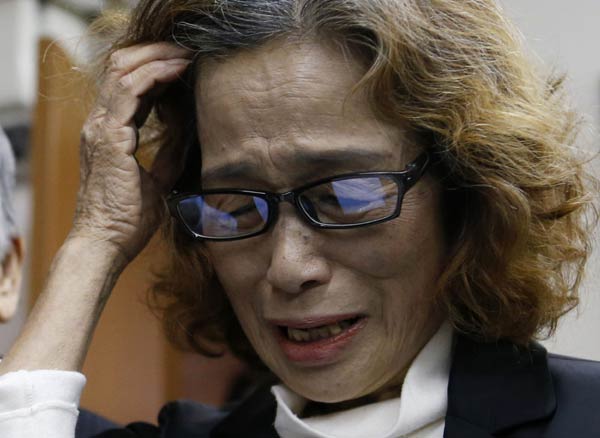Japan must learn right lesson from IS killings
Updated: 2015-02-09 07:46
By Liang Yunxiang(China Daily)
|
||||||||
 |
|
Junko Ishido, mother of Japanese journalist Kenji Goto who was held captive by Islamic State militants, touches her head as she speaks to reporters at her house in Tokyo February 1, 2015. [Photo/Agencies] |
The Islamic State group, which controls large swathes of northern Iraq and Syria, recently beheaded two hostages from Japan, a country that doesn't seem to be even remotely a target for the militant group's brutality and contempt for humanity. The murders, of course, have come as an overwhelming shock to the civilized world, as well as a wake-up call for Japanese leaders who failed to negotiate the release of the hostages.
The crisis started with the release of an online video, in which the IS extremists threatened to kill the two Japanese hostages in response to Japanese Prime Minister Shinzo Abe's financial support for the countries fighting the Islamic extremists. During his visit to the Middle East last month, Abe offered about $200 million in humanitarian and development aid to the countries.
After beheading the two Japanese hostages, the IS extremists released a video showing a Jordanian pilot they had kidnapped being burned alive after trilateral negotiations involving Japan, Jordan and the IS broke down. Furious at the IS' brutal act, Jordan hanged two Iraqi jihadists, including a woman, on Feb 4, bringing the futile negotiations to a tragic end.
Until the beheadings, the IS seemed to pose a threat only to the Middle East, the United States and Europe. In fact, France is yet to recover from the shock of the attack on the offices of satirical magazine Charlie Hebdo in Paris on Jan 7 in which 12 people were killed. But now even Japan, which is not directly involved in the assault on the IS, has become a target.
Does it have something to do with Japan's "positive pacifism", especially its Middle East policy? To strengthen Japan's diplomatic influence and increase military presence across the world, Abe has been seeking a greater role for his country in international affairs, mostly by loosening the constitutional restraints imposed on its defense forces after World War II.
- Global health entering new era: WHO chief
- Brazil's planning minister steps aside after recordings revelation
- Vietnam, US adopt joint statement on advancing comprehensive partnership
- European border closures 'inhumane': UN refugee agency
- Japan's foreign minister calls A-bombings extremely regrettable
- Fukushima impact unprecedented for oceans: US expert

 Stars of Lijiang River: Elderly brothers with white beards
Stars of Lijiang River: Elderly brothers with white beards
 Wealthy Chinese children paying money to learn British manners
Wealthy Chinese children paying money to learn British manners
 Military-style wedding: Fighter jets, grooms in dashing uniforms
Military-style wedding: Fighter jets, grooms in dashing uniforms
 Striking photos around the world: May 16 - May 22
Striking photos around the world: May 16 - May 22
 Robots help elderly in nursing home in east China
Robots help elderly in nursing home in east China
 Hanging in the air: Chongqing holds rescue drill
Hanging in the air: Chongqing holds rescue drill
 2.1-ton tofu finishes in two hours in central China
2.1-ton tofu finishes in two hours in central China
 Six things you may not know about Grain Buds
Six things you may not know about Grain Buds
Most Viewed
Editor's Picks

|

|

|

|

|

|
Today's Top News
Liang avoids jail in shooting death
China's finance minister addresses ratings downgrade
Duke alumni visit Chinese Embassy
Marriott unlikely to top Anbang offer for Starwood: Observers
Chinese biopharma debuts on Nasdaq
What ends Jeb Bush's White House hopes
Investigation for Nicolas's campaign
Will US-ASEAN meeting be good for region?
US Weekly

|

|









